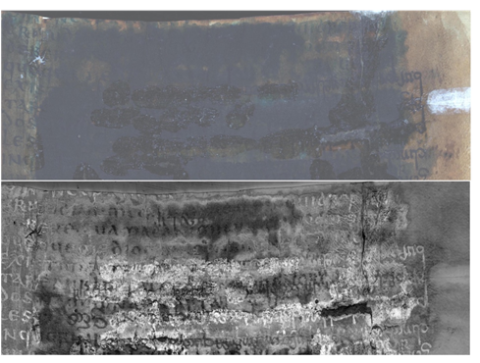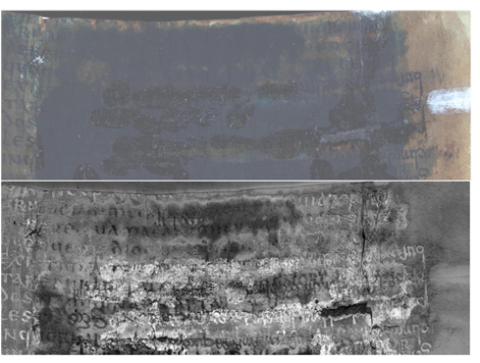
Ancient Treatise on Platonic Tradition Discovered
The Leon Robin Center for Research on Ancient Thought has discovered the oldest surviving copy of a Latin treatise on Plato in Verona, Italy. Once deciphered, this manuscript will allow us to fill in important gaps in the text of Apuleius, and will thus complete our knowledge of the Platonic tradition.
The ancient parchment had been erased and reused numerous times, as was often the case at that time. These are called palimpsest manuscripts. The RESCAPALM project, under the responsibility of CNRS researcher Victor Gysembergh, therefore applied multispectral imaging technologies to decipher the ancient manuscript. The objective is to recover the erased texts in the palimpsest manuscript designated by the number XL (38) of the Capitular Library of Verona, the oldest library in Europe.
For example, Palimpsest XL (38) was already known to contain very old copies of the works of Virgil, Titus Livius and Euclid, which were erased to receive a copy of the Moral Lessons of Gregory the Great. During the multispectral imaging campaign that took place from May 2 to 14, 2022, Emanuel Zingg, researcher at the Faculty of Letters of Sorbonne University, discovered among the erased texts the oldest copy of a treatise on Plato's works written by the famous Latin writer Apuleius of Madaura.
The copy of the treatise on Plato was written in uncial letters that can be dated approximately to the fifth or sixth century AD. It contains a passage from a text attributable to the third book of the Latin treatise On Plato written by the Roman author Apuleius of Madaura (a city in North Africa, now in Algeria), who lived in the Roman Empire in the second century. The text was first published in 2016, based on a much more recent manuscript, dating from the 13th century, when it belonged to the medieval Sorbonne (it is now kept in the Vatican Library). In the passage of the Veronese palimpsest, which allowed the identification of the text, Apuleius provides a summary of the tenth book of the Republic of Plato. Once fully deciphered, this manuscript will allow us to fill in important gaps in Apuleius' text, and thus complete our knowledge of the Platonic tradition in Greek and Latin antiquity.
At the intersection of natural sciences and humanities, this work was carried out in collaboration with the American teams EMEL (Early Manuscripts Electronic Library) and Lazarus Project (University of Rochester). The RESCAPALM project is funded by the Sorbonne University Alliance as part of the call for projects "Emergence @ Sorbonne University" 2021.

Manuscrit de Vérone, Bibliothèque Capitulaire, XL (38), f. 334v (détail). En haut, image en éclairage naturel. En bas, image multispectrale produite par l'équipe EMEL Avec l’aimable autorisation de la Fondazione Biblioteca Capitolare.
